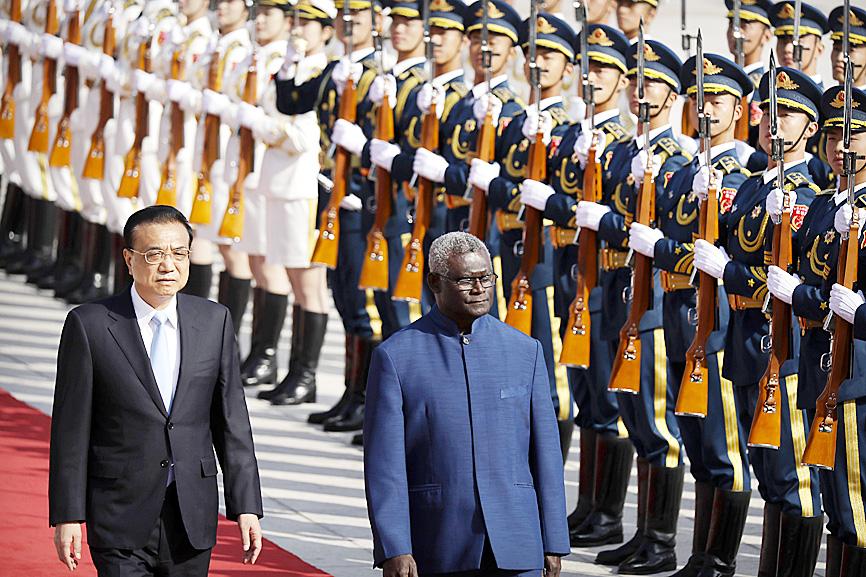China said it has signed a security agreement with the Solomon Islands, which had faced pressure from nearby Australia and the US to reject the deal.
Chinese Minister of Foreign Affairs Wang Yi (王毅) and Solomon Islands Minister of Foreign Affairs Jeremiah Manele “officially signed an intergovernmental framework agreement on security cooperation the other day,” Chinese Ministry of Foreign Affairs spokesman Wang Wenbin (汪文斌) said yesterday at a regular news briefing in Beijing.
“The two sides will conduct cooperation, including maintenance of social order, protection and safety of people’s lives and property, humanitarian assistance and natural disaster response, to help the Solomon Islands strengthen capacity-building and safeguard its own security,” Wang Wenbin said.

Photo: AP
US National Security Council Indo-Pacific Affairs Coordinator Kurt Campbell plans to lead a delegation of US officials to the South Pacific nation in the coming days, a White House statement said.
The tour is to include Hawaii, Fiji and Papua New Guinea.
“The delegation will meet with senior government officials to ensure our partnerships deliver prosperity, security and peace across the Pacific Islands and the Indo-Pacific [region],” the statement said.
Earlier this month, Australian Minister for International Development and the Pacific Zed Seselja made an unusual mid-election campaign trip to the Solomon Islands, where he publicly asked the Pacific nation’s leadership to “consider” not signing the security pact with Beijing.
The flurry of diplomacy was sparked by the leaking of a draft agreement late last month between the Chinese government and the Solomon Islands that allowed the deployment of China’s security forces in the case of domestic unrest.
The agreement also facilitates a safe harbor for Chinese naval vessels just 2,000km from the Australian coastline.
Speaking to Australian Broadcasting Corp on Sunday, Australian Minister for Foreign Affairs Marise Payne said the government was concerned about a “lack of transparency” in the security agreement.
However, Solomon Islands Prime Minister Manasseh Sogavare has said that the pact would not allow China to construct a military base and has strongly asserted his country’s right to an independent foreign policy.

SECURITY: As China is ‘reshaping’ Hong Kong’s population, Taiwan must raise the eligibility threshold for applications from Hong Kongers, Chiu Chui-cheng said When Hong Kong and Macau citizens apply for residency in Taiwan, it would be under a new category that includes a “national security observation period,” Mainland Affairs Council (MAC) Minister Chiu Chui-cheng (邱垂正) said yesterday. President William Lai (賴清德) on March 13 announced 17 strategies to counter China’s aggression toward Taiwan, including incorporating national security considerations into the review process for residency applications from Hong Kong and Macau citizens. The situation in Hong Kong is constantly changing, Chiu said to media yesterday on the sidelines of the Taipei Technology Run hosted by the Taipei Neihu Technology Park Development Association. With

CARROT AND STICK: While unrelenting in its military threats, China attracted nearly 40,000 Taiwanese to over 400 business events last year Nearly 40,000 Taiwanese last year joined industry events in China, such as conferences and trade fairs, supported by the Chinese government, a study showed yesterday, as Beijing ramps up a charm offensive toward Taipei alongside military pressure. China has long taken a carrot-and-stick approach to Taiwan, threatening it with the prospect of military action while reaching out to those it believes are amenable to Beijing’s point of view. Taiwanese security officials are wary of what they see as Beijing’s influence campaigns to sway public opinion after Taipei and Beijing gradually resumed travel links halted by the COVID-19 pandemic, but the scale of

A US Marine Corps regiment equipped with Naval Strike Missiles (NSM) is set to participate in the upcoming Balikatan 25 exercise in the Luzon Strait, marking the system’s first-ever deployment in the Philippines. US and Philippine officials have separately confirmed that the Navy Marine Expeditionary Ship Interdiction System (NMESIS) — the mobile launch platform for the Naval Strike Missile — would take part in the joint exercise. The missiles are being deployed to “a strategic first island chain chokepoint” in the waters between Taiwan proper and the Philippines, US-based Naval News reported. “The Luzon Strait and Bashi Channel represent a critical access

Pope Francis is be laid to rest on Saturday after lying in state for three days in St Peter’s Basilica, where the faithful are expected to flock to pay their respects to history’s first Latin American pontiff. The cardinals met yesterday in the Vatican’s synod hall to chart the next steps before a conclave begins to choose Francis’ successor, as condolences poured in from around the world. According to current norms, the conclave must begin between May 5 and 10. The cardinals set the funeral for Saturday at 10am in St Peter’s Square, to be celebrated by the dean of the College